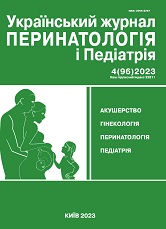Student-centred orientation in the medical educational space of Ukraine on the example of Ivano-Frankivsk national medical university
DOI:
https://doi.org/10.15574/PP.2023.96.151Keywords:
student-centredness, student-centred learning, student, higher education institutionsAbstract
The issues of student-centred learning are fundamental in the organisation of educational activities of higher education institutions in Europe and are covered in many final documents of the Ministerial Conferences of the European Higher Education Area. Student-centredness is the accumulation and concentration of efforts focused more on the needs of the student, based on the consideration of the individual qualities of students, the ability to form individual educational trajectories. The essence of student-centredness is to create a model of education development in which a student turns from an object into a subject of educational activity, i.e. an active participant in the educational process.
Purpose - to analyse the peculiarities of student-centredness as a modern direction of organising the educational process in higher education institutions and to determine the peculiarities of implementing a student-centred approach in the training of students at Ivano-Frankivsk National Medical University.
On the example of Ivano-Frankivsk National Medical University, student-oriented/student-centred learning is one of the most effective pedagogical and methodological approaches. It is implemented by creating an individual educational trajectory in the first place. This is an individual way of realising the personal potential of each faculty applicant in educational activities, which is formed by determining and taking into account his/her personal abilities, own interests, educational and social needs, professional motivation, opportunities, and experience, based on the choice of types and forms of education of participants in the educational process and the proposed educational programmes, selected academic disciplines, their level of complexity, methods and means of teaching. An individual educational trajectory at the university is carried out through an individual curriculum, in particular, through the individual choice of disciplines, courses and educational programmes, the applicant’s research work, the development of spiritual potential and professional training.
No conflict of interests was declared by the authors.
References
Boytsanyuk SI, Kuzniak NB, Bambulyak AV, Dmitrenko RR. (2021). Organisation of student-centred learning in a medical university. Sciences of Europe. 67: 52-54.
Cabinet of Ministers of Ukraine. (2022). On approval of the Strategy for the Development of Higher Education in Ukraine for 2022-2032. Order of the Cabinet of Ministers of Ukraine. of the Cabinet of Ministers of Ukraine of 23 February 2022, No. 286-p. URL: https://zakon.rada.gov.ua/laws/show/286-2022-%D1%80#Text.
Dyman TM, Bonkovsky OA, Vovkohon AG. (2017). European Higher Education Area and the Bologna Process: Study guide. BNAU. NU: OMA. Odesa: 106.
EURASHE. (2009). The European Higher Education Area in the new Decade. Communiqué of the Conference of European Ministers Responsible for Higher Education, Leuven and Louvain-la-Neuve. URL: https://www.eurashe.eu/library/modernisingphe/Bologna_2009_Leuven-Communique.pdf.
European Commission. (2024). Report of the European Commission «Improving the quality of teaching and learning in Europe’s higher education institutions». URL: http://ec.europa.eu/dgs/education_culture/repository/education/library/reports/modernisation_en.pdf.
European Higher Education Area. (2012). Communiqué of the Ministerial Conference of the European Higher Education Area. Bucharest, Romania, 26-27 April 2012. URL: http://www.edupolicy.org.ua/files/Bucharest_Communique(2012).pdf.
Korotich NM. (2017). Independent work of students as a factor in the preparation of a specialist in the conditions of the credit-modular system of education. The world of medicine and biology. 1(59): 219-222.
Kryzhko V, Elkin M, Starozhko O, Tilcharova K, Hrytsaiova O. (2015). Higher education and the European educational space. Berdiansk: Publishing house: 380.
Kushnarenko N, Solianyk A. (2022). Student-centred approach in the training of documentary specialists. Bulletin of the Book Chamber. 10: 32-43.
Lisetska IS, Dmytrenko IA. (2022). The role of independent work of students in the training of future highly qualified specialists. Modern paediatrics. Ukraine. 7(127): 141-144. https://doi.org/10.15574/SP.2022.127.141
Ministry of Education and Science of Ukraine. (2019). On approval of the Regulation on accreditation of educational programmes for the training of higher education applicants. Order of the Ministry of Education and Science of Ukraine dated 11.07.2019 No. 977. Pedagogy development, education, culture: integration trends in the modern world: 355-360. URL: https://zakon.rada.gov.ua/laws/show/z0880-19#Text.
Udych ZI, Shulga IM, Mironova LA. (2023). Student-centred approach in the context of digitalisation of learning. Theory and methods of professional education. 2; 56: 151-154. https://doi.org/10.32782/2663-6085/2023/56.2.33
Verkhovna Rada Ukrainy. (2014). On Higher Education. Law of Ukraine of 01.07.2014 No. 1556-VII. URL: https://zakon.rada.gov.ua/laws/show/1556-18#Text.
Verkhovna Rada Ukrainy. (2019). On professional higher education. Law of Ukraine of 06.06.2019 No. 2745-VIII. URL: https://zakon.rada.gov.ua/laws/show/2745-19#Text.
Downloads
Published
Issue
Section
License
Copyright (c) 2023 Ukrainian Journal of Perinatology and Pediatrics

This work is licensed under a Creative Commons Attribution-NonCommercial 4.0 International License.
The policy of the Journal “Ukrainian Journal of Perinatology and Pediatrics” is compatible with the vast majority of funders' of open access and self-archiving policies. The journal provides immediate open access route being convinced that everyone – not only scientists - can benefit from research results, and publishes articles exclusively under open access distribution, with a Creative Commons Attribution-Noncommercial 4.0 international license(СС BY-NC).
Authors transfer the copyright to the Journal “MODERN PEDIATRICS. UKRAINE” when the manuscript is accepted for publication. Authors declare that this manuscript has not been published nor is under simultaneous consideration for publication elsewhere. After publication, the articles become freely available on-line to the public.
Readers have the right to use, distribute, and reproduce articles in any medium, provided the articles and the journal are properly cited.
The use of published materials for commercial purposes is strongly prohibited.

